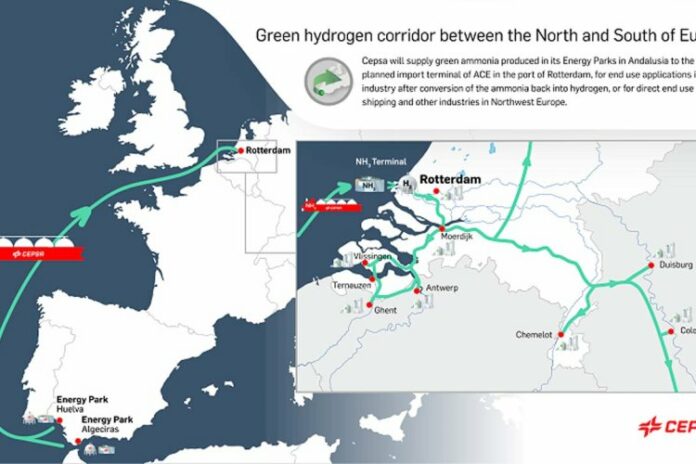As part of the Andalusian Green Hydrogen Valley, Cepsa will develop a green ammonia plant at its San Roque Energy Park in Cadiz that will be operational in 2027. With an investment of 1 billion euros, it will be the largest plant in Spain and one of the largest in Europe.
The project, which could include potential partners, will create 3,300 jobs – including direct, indirect and induced – and a new market in Algeciras for green ammonia, a product derived from green hydrogen that can be used both as a sustainable marine fuel and as a carrier of green hydrogen for its transportation to distant locations.
The alliance with Yara Clean Ammonia will help establish a safe, resilient, and cost-efficient supply chain for delivering green ammonia and paves the way for Cepsa to deliver the first green hydrogen molecules to its customers by using Yara Clean Ammonia’s global supply base and logistical footprint. This will in turn allow the energy company to start marketing green hydrogen and green ammonia to industrial customers and maritime customers in Rotterdam and Central Europe.
The new green ammonia plant will be powered by green hydrogen produced by Cepsa and EDP at the 1 GW plant to be developed in Campo de Gibraltar. It will have an annual production capacity of up to 750,000 tons of ammonia, which can prevent 3 million tons of CO2 emissions. Yara, a global leader in ammonia production, has extensive experience in this market, which will ensure the development of a viable green energy corridor in Europe. Cepsa will offer its extensive experience in producing fuels and its knowledge of the maritime sector to support its customers’ decarbonization strategy.
Maarten Wetselaar, Cepsa’s CEO, said:
“The agreements are a crucial step towards the long-term viability of the Andalusian Green Hydrogen Valley and the implementation of the first maritime corridor of sustainable fuels that will link the South with the North of Europe. Green hydrogen and its derivatives are the fastest, most viable and competitive solution to accelerate the energy transition in heavy transport and ensure energy independence in Europe. The agreements announced today give our project crucial access to markets, customers and distribution infrastructure: three key elements to unlock the potential of our Hydrogen valley. This is major news for the decarbonization of European shipping and industry and for the planet.”
Helmie Botter, manager of hydrogen business development at Gasunie, said:
“With this agreement, we are strengthening the hydrogen corridor between Spain and the Netherlands. Through the logistics import hubs, such as the Port of Rotterdam, and the nationwide hydrogen network of Gasunie subsidiary Hynetwork Services to bring the green hydrogen to European industrial users, the Netherlands is positioning itself to become the gateway for Northwest Europe with hydrogen.”
The partnerships represent a new step in the development of the Andalusian Green Hydrogen Valley, the largest project presented in Europe, with a capacity of 2 GW to produce 300,000 tons of green hydrogen. In addition, it enables the development of a hydrogen value chain, promoting the decarbonization of industry in Andalusia and the development of a new sustainable marine fuels industry with the capacity to export to the rest of Europe.
With this commercial cooperation agreement, Cepsa will have greater capacity to supply hydrogen and green ammonia to its customers in Northern Europe. The Spanish energy company has an agreement with ACE Terminal (a consortium of the companies Gasunie, HES International, and Vopak) to distribute green ammonia to the planned import terminal in the Port of Rotterdam, for final use in industry after converting the ammonia back into green hydrogen, or for direct use. In addition, on May 10, Cepsa announced a collaborative agreement with GETEC to supply it with green hydrogen and its derivatives, which GETEC will distribute to industrial customers in different European countries. The company provides heating, cooling and electrical services to industrial customers in various sectors (chemical, automotive, food, pharmaceutical, polymer and paper industries) in Germany, the Netherlands, Switzerland and Italy.



